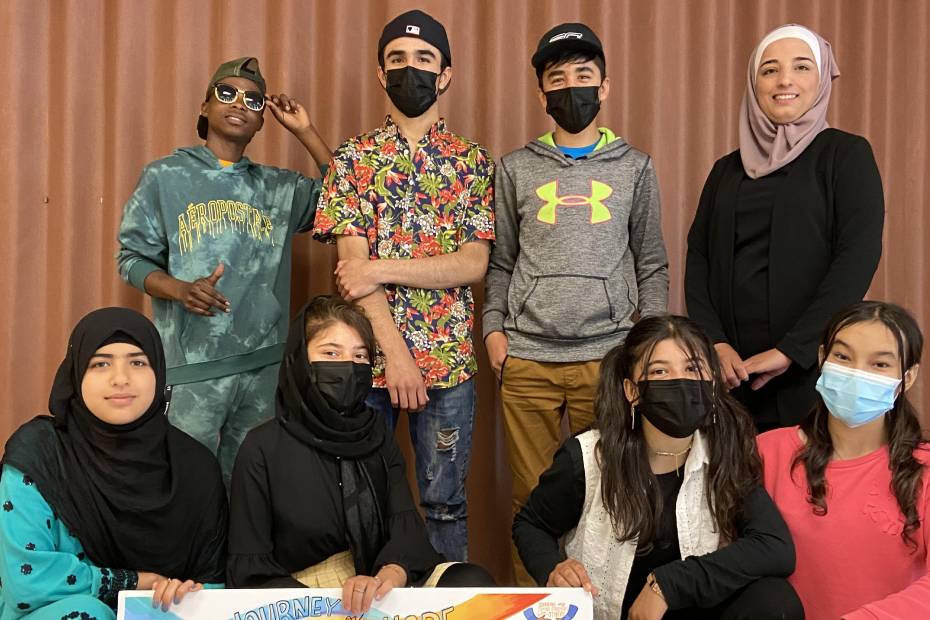Published August 17, 2022 • 5 Min Read
Thanaa Ahmed came to Canada as a refugee from Syria. She lives in St. John’s, Newfoundland with her husband and young daughter.
After the war, we lived in Turkey for three years. There was no hope there, no future. The only thing available was work — making your own daily life. Nothing more than that.
We were looking for a future, so we decided to immigrate to Canada.
I lived in a big city in Turkey — and also came from a big city in Syria — with crowded spaces and multiple stores. Here in Canada, especially here in Newfoundland and Labrador, there are more landscaped areas and trees — there’s more nature.
At first, I was afraid of the feeling of starting a new life here but then you see the smiling people’s faces, you just feel at peace.
When we arrived, two people from the Association of New Canadians met us and another family at the airport. One of them spoke Arabic, and the other spoke English. We stayed at a hotel and later found an apartment. We enrolled in language classes, where we improved our English.
It was hard at the beginning. There was a language barrier, but people here are super, super friendly. They talk to you before you even talk to them. My daughter — she’s a child — so she can pick up English quickly. She’s very friendly and connects with people easily, so she made many friends with local children. She has the accent of her new homeland and can speak with others very freely.
A true journey of hope
I got involved with the Association of New Canadians’ Journey of Hope program along with other people from different countries. Our program deals with youth in groups 15-to-24 and 25-to-34. We discuss issues like language barriers or the different cultures at home and school. Youth may be struggling or having some trouble in their life, which may cause mental health problems or stress.
From the beginning, I gave the program some background about Syrian culture and some of the differences. There were also people from Congo, Sudan, and so on, and each of us talked about what was appropriate or not in our culture.
My training as a peer support facilitator is important to me so I can provide help to newcomer youth in need. I’ll also be able to build more social skills and learn more methods for solving problems in the future.
In a session, we use art to help the participants explore or uncover the problems or issues they’re experiencing and help them deal with them. When I did the program, I did a timeline of my life. I drew a line that represented me from my childhood. As I came here, starting new things, I was hoping for a better future. I represented my younger self with a little bit of black and then coming here to Canada with a little bit of white. I used flowers to represent my friends. We’re trying to express feelings by using art.
Journey of Hope is an innovative mental health program for newcomer youth. It offers the opportunity to explore their resiliencies, coping strategies and life journeys through meaningful art projects.
Over the previous three years, the RBC Foundation has donated $190,000 to support Journey of Hope and its predecessor program 2Gether Youth Mental Health. The RBC Youth Mental Well-being Project is our commitment to supporting programs that help youth and families access the right care at the right time.
Discover how RBC helps newcomers settle faster and meet our team of Newcomer Advisors across the country.
Back in our country, mental health has a real stigma, so it’s not easy to talk about. It’s been three and a half years since I came to Canada, but the program helped me overcome the stigma and understand more. There is help you can ask for, and you will find people who will help you. They will lead you in the right direction.
Our program’s purpose is to tell youth that we are here to help. It’s okay to be stressed, it’s okay to be depressed, it’s okay to struggle — you don’t have to be perfect. I learned about mental health, which is just like your physical health: problems are treatable, and there’s no stigma attached here. It’s affected my life — now I’m more open to my husband at home and my friends.
I can see a very good future for this program here in Newfoundland and Labrador, and hopefully around all of Canada after that. It’s all about working with the youth to be part of the community here, to help the community more, and be responsible people. I can see a very bright future for our program.
RBC actively supports organizations like the Association for New Canadians and its goals of helping people create a sense of community and develop a social support network. Creating a positive social impact is integral to how we do business.
This article is intended as general information only and is not to be relied upon as constituting legal, financial or other professional advice. A professional advisor should be consulted regarding your specific situation. Information presented is believed to be factual and up-to-date but we do not guarantee its accuracy and it should not be regarded as a complete analysis of the subjects discussed. All expressions of opinion reflect the judgment of the authors as of the date of publication and are subject to change. No endorsement of any third parties or their advice, opinions, information, products or services is expressly given or implied by Royal Bank of Canada or any of its affiliates.
Share This Article






